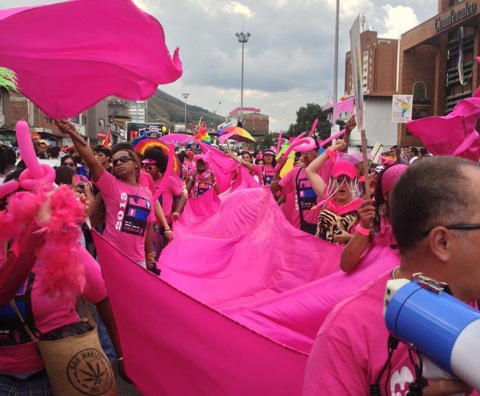
July 2014—Maria Paula Santamaría died for reasons that were entirely preventable. When she needed urgent medical attention, she was turned away from a hospital in her hometown of Cali, Colombia, because she was transgender or “trans.” Santamaría was assigned male at birth, but identified as a woman. The hospital refused to serve her, discriminating against her because she did not fit society’s definition of gender.
Trans people are frequently misunderstood, marginalized and disenfranchised. Violence and exclusion are all-too-common experiences for trans women in Colombia. Between 2008 and 2013, Colombia reported the fourth highest rate of murders of trans people in the world. In Cali alone, 42 trans women were murdered between 2005 and 2011.
Santamaría’s death prompted her friends to establish Santamaría Fundación in 2005. Since that time, the foundation has been a regional leader in trans human rights grassroots activism. The organization documents and monitors human rights violations of trans people in Cali and the surrounding region and uses this data to advocate for inclusive policies and human rights protections.
Through the Lesbian, Gay, Bisexual and Transgender (LGBT) Global Development Partnership, USAID is partnering with the Astraea Lesbian Foundation for Justice to support organizations like Santamaría Fundación in their efforts to increase human rights, accountability and economic development opportunities for LGBT persons worldwide.
“Santamaría Fundación has made incredible strides to protect trans people in the face of extreme physical and emotional harm and systemic violence,” said J. Bob Alotta, executive director, Astraea Lesbian Foundation for Justice.
For example, in 2010, the advocacy work performed by Santamaría Fundación led to the passage of the National Police “Directiva 006,” which established measures to ensure respect for and protection of LGBT people in Colombia. The foundation also trains its members to stay vigilant against violence and human right abuses.
“In Colombia, violence is somehow naturalized; trans women have very low or no educational opportunities and little to no access to dignified health care,” explains Angely Lorena Corrales, a coordinator at the Santamaría Fundación. “[We must] strengthen the potential of trans women leaders in our community so that we can all know and defend our rights.”
Like many trans-led organizations, Santamaría Fundación relies on a small staff, volunteer labor and very limited funding. With the support it receives from the LGBT Global Development Partnership, Santamaría Fundación will continue to document and monitor human rights violations against LGBT people in the Valle del Cauca region, promote local public policies to secure protections for trans people, and support those who report human rights violations.
In the last six months, Santamaría Fundación, with the support of volunteer law students from a local university, has provided legal accompaniment to 30 trans women whose fundamental rights have been violated. Through this process, trans women who have experienced discrimination or violence are encouraged and supported to submit official complaints with the local Prosecutor’s Office. This office is in charge of ensuring the promotion, protection and defense of the rights of people living in Cali.
The constant threat of violence makes it difficult for trans women to issue legal complaints. The challenges, however, do not stop the ever-resilient women of Santamaría Fundación. They have developed a safety protocol, which provides members and staff with strategies for self-protection. For example, they have devised an alert code to inform their members of the threat level the organization is experiencing. During a red alert, members travel to and from the office in groups, do phone check-ins, and request assistance from the police.
These strategies protect the trans women and their community as they work to achieve their vision of a Colombia in which the human rights of all people—regardless of their gender identity or expression—will be respected.
Links







Comment
Make a general inquiry or suggest an improvement.